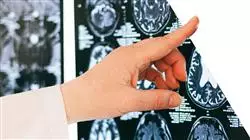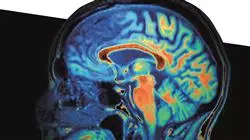University certificate
The world's largest faculty of nursing”
Introduction to the Program
Boost your professional healthcare career and be part of the recovery of patients with neurodegenerative diseases thanks to this Postgraduate diploma”

Some advances in Cognitive Neuropsychology have been achieved thanks to novel techniques such as electroencephalography, neuroimaging and neuropsychological tests that measure the psychological and functional performance of the brain. These strategies have led to alternative surgical treatments to treat diseases such as schizophrenia or autism. It is a discipline that continues to expand and perfect its applications, but, above all, demanding experts in the field who can respond with a specialized and highly focused service in the most modern Neuropsychology.
TECH offers an intensive program over a period of 6 months that will provide graduates with all the information they need to master the new issues of this discipline. By taking the Postgraduate diploma, nurses will delve into the principles of Cognitive Neuropsychology, as well as the principles of neuropsychological and behavioral disorders of genetic origin, with special emphasis on aphasia, agraphia and alexia, and cognitive deficits. It will also delve into the principles and origin of mixed transcortical, as well as psychological disorders associated with pathological aging. Finally, it will focus on the main techniques of neuropsychological assessment and rehabilitation, in order to provide an exhaustive review of treatments and their future prospects.
All of this through a 100% online program, which is developed over 600 hours of theoretical-practical and additional material, selected and designed in detail by the teaching team. Likewise, the qualification is a dynamic and simple experience thanks to its various digital formats. It’s developed based on downloadable content, so the student only needs a device with an Internet connection. In addition, the materials will be available even after the program has been completed.
Analyze cognitive rehabilitation systems to apply clinical technology in conditions such as olfactory agnosias, asonosognia and asomatognosia"
This Postgraduate diploma in Cognitive Neuropsychology contains the most complete and up-to-date scientific program on the market. The most important features include:
- The development of practical cases presented by experts in Nursing and Cognitive Neuropsychology
- The graphic, schematic, and practical contents with which they are created, provide scientific and practical information on the disciplines that are essential for professional practice
- Practical exercises where self-assessment can be used to improve learning
- Its special emphasis on innovative methodologies
- Theoretical lessons, questions to the expert, debate forums on controversial topics, and individual reflection assignments
- Content that is accessible from any fixed or portable device with an Internet connection
A program designed by experts in Neuropsychology for you to adopt the most appropriate action for each real case you face, thanks to an up-to-date knowledge of ASD"
The program’s teaching staff includes professionals from the sector who contribute their work experience to this educational program, as well as renowned specialists from leading societies and prestigious universities.
Its multimedia content, developed with the latest educational technology, will allow professionals to learn in a contextual and situated learning environment, i.e., a simulated environment that will provide immersive education programmed to prepare in real situations.
The design of this program focuses on problem-based learning, by means of which the professional must try to solve the different professional practice situations that arise throughout the academic program. For this purpose, the student will be assisted by an innovative interactive video system created by renowned and experienced experts.
A program that will make you an expert in the alterations of the level of consciousness and its most common symptoms so that you can identify them quickly"

Be a multidisciplinary nurse studying in depth the pathologies in attention and memory, as well as the Dysexecutive Syndrome"
Syllabus
The content of this Postgraduate diploma has been developed in detail by professionals versed in Nursing and Neuropsychology to offer a quality syllabus. TECH has not only taken into account the theoretical instruction of knowledge, but has also selected a teaching team that has extensive experience in clinical centers, so that they can share it with nurses who enroll in the program. In addition, it applies the effective and innovative Relearning methodology, which facilitates the progressive and simple assimilation of the contents without long hours of study. All this in order to offer an educational experience that adapts to the needs of the most demanding specialists.

Thanks to this program you will be able to investigate the neurobiological foundations of memory to understand in depth the functioning of cognitive development"
Module 1. Cognitive Functions
1.1. Neurological Principles of Attention
1.1.1. Introduction to the Concept of Attention
1.1.2. Neurobiological Principles and Foundations of Attention
1.2. Neurobiological Principles of Memory
1.2.1. Introduction to the Concept of Memory
1.2.2. Neurobiological Principles and Foundations of Memory
1.3. Neurological Principles of Language
1.3.1. Introduction to the Concept of Language
1.3.2. Neurobiological Principles and Foundations of Language
1.4. Neurobiological Principles of Perception
1.4.1. Introduction to the Concept of Perception
1.4.2. Neurobiological Principles and Foundations of Perception
1.5. Visuospatial Neurobiological Principles
1.5.1. Introduction to Visuospatial Functions
1.5.2. Principles and Fundamentals of Visuospatial Functions
1.6. Neurobiological Principles of Executive Functions
1.6.1. Introduction to Executive Functions
1.6.2. Principles and Fundamentals of Executive Functions
1.7. Apraxias
1.7.1. What is Praxis?
1.7.2. Features and Types
1.8. Gnosis
1.8.1. What is Praxis?
1.8.2. Features and Types
1.9. Social Cognition
1.9.1. Introduction to Social Cognition
1.9.2. Characteristics and Theoretical Foundations
Module 2. Brain Injury
2.1. Neuropsychological and Behavior Disorders of Genetic Origin
2.1.1. Introduction
2.1.2. Genes, Chromosomes and Hereditary
2.1.3. Genes and Behavior
2.2. Early Brain Injury Disorder
2.2.1. Introduction
2.2.2. The Brain in Early Childhood
2.2.3. Pediatric Cerebral Palsy
2.2.4. Psychosyndromes
2.2.5. Learning Disorders
2.2.6. Neurobiological Disorders that Affect Learning
2.3. Vascular Brain Disorders
2.3.1. Introduction to Cerebrovascular Disorders
2.3.2. Most Common Types
2.3.3. Characteristics and Symptomology
2.4. Brain Tumors
2.4.1. Introduction to Brain Tumors
2.4.2. Most Common Types
2.4.3. Characteristics and Symptomology
2.5. Cranioencephalic Traumas
2.5.1. Introduction to Trauma
2.5.2. Most Common Types
2.5.3. Characteristics and Symptomology
2.6. Infections of the CNS
2.6.1. Introduction the CNS Infections
2.6.2. Most Common Types
2.6.3. Characteristics and Symptomology
2.7. Epileptic Disorders
2.7.1. Introduction to Epileptic Disorders
2.7.2. Most Common Types
2.7.3. Characteristics and Symptomology
2.8. Alterations in the Level of Consciousness
2.8.1. Introduction to Altered Levels of Consciousness
2.8.2. Most Common Types
2.8.3. Characteristics and Symptomology
2.9. Acquired Brain Injury
2.9.1. Concept of Acquired Brain Injury
2.9.2. Most Common Types
2.9.3. Characteristics and Symptomology
2.10. Disorders Related to Pathological Ageing
2.10.1. Introduction
2.10.2. Psychological Disorders Related to Pathological Ageing
Module 3. Aphasias, Agraphias and Alexias
3.1. Broca's Aphasia
3.1.1. Principles and Origin of Broca's Aphasia
3.1.2. Characteristics and Symptomology
3.1.3. Assessment and Diagnosis
3.2. Wernicke’s Aphasia
3.2.1. Basis and Origin of Wernicke's Aphasia
3.2.2. Characteristics and Symptomology
3.2.3. Assessment and Diagnosis
3.3. Conduction Aphasia
3.3.1. Basis and Origin of Conduction Aphasia
3.3.2. Characteristics and Symptomology
3.3.3. Assessment and Diagnosis
3.4. Global Aphasia
3.4.1. Basis and Origin of Global Aphasia
3.4.2. Characteristics and Symptomology
3.4.3. Assessment and Diagnosis
3.5. Sensory Transcortical Aphasia
3.5.1. Principles and Origin of Broca's Aphasia
3.5.2. Characteristics and Symptomology
3.5.3. Assessment and Diagnosis
3.6. Motor Transcortical Aphasia
3.6.1. Basis and Origin of Motor Transcortical Aphasia
3.6.2. Characteristics and Symptomology
3.6.3. Assessment and Diagnosis
3.7. Mixed Transcortical Aphasia
3.7.1. Basis and Origin of Mixed Transcortical Aphasia
3.7.2. Characteristics and Symptomology
3.7.3. Assessment and Diagnosis
3.8. Anomic Aphasia
3.8.1. Basis and Origin of Anomic Aphasia
3.8.2. Characteristics and Symptomology
3.8.3. Assessment and Diagnosis
3.9. Agraphias
3.9.1. Basis and Origin of Agraphias
3.9.2. Characteristics and Symptomology
3.9.3. Assessment and Diagnosis
3.10. Alexias
3.10.1. Basis and Origin of Alexias
3.10.2. Characteristics and Symptomology
3.10.3. Assessment and Diagnosis
Module 4. Cognitive Deficiencies
4.1. Attention Pathology
4.1.1. Main Attention Pathologies
4.1.2. Characteristics and Symptomology
4.1.3. Assessment and Diagnosis
4.2. Memory Pathology
4.2.1. Main Memory Pathologies
4.2.2. Characteristics and Symptomology
4.2.3. Assessment and Diagnosis
4.3. Dysexecutive Syndrome
4.3.1. What is Dysexecutive Syndrome?
4.3.2. Characteristics and Symptomology
4.3.3. Assessment and Diagnosis
4.4. Apraxias I
4.4.1. Concept of Apraxia
4.4.2. Main Modalities
4.4.2.1. Ideomotor Apraxia
4.4.2.2. Ideational Apraxia
4.4.2.3. Constructional Apraxia
4.4.2.4. Clothing Apraxia
4.5. Apraxias II
4.5.1. Gait Apraxia
4.5.2. Apaxia of Speech or Phonation
4.5.3. Optical Apraxia
4.5.4. Callosal Apraxia
4.5.5. Examination of the Apraxias:
4.5.5.1. Neuropsychological Assessment
4.5.5.2. Cognitive Rehabilitation
4.6. Agnosias I
4.6.1. Concept of Agnosias
4.6.2. Visual Agnosias
4.6.2.1. Agnosia for Objects
4.6.2.2. Simultanagnosia
4.6.2.3. Prospagnosia
4.6.2.4. Chromatic Agnosia
4.6.2.5. Others
4.6.3. Auditory Agnosias
4.6.3.1. Amusia
4.6.3.2. Agnosia for Sounds
4.6.3.3. Verbal Agnosia
4.6.4. Somatosensory Agnosias
4.6.4.1. Asteroganosia
4.6.4.2. Tactile Agnosia
4.7. Agnosias II
4.7.1. Olfactory Agnosias
4.7.2. Agnosia in Diseases
4.7.2.1. Anosognosia
4.7.2.2. Asomatognosia
4.7.3. Assessment of Agnosias
4.7.4. Cognitive Rehabilitation
4.8. Social Cognition Deficit
4.8.1. Introduction to Social Cognition
4.8.2. Characteristics and Symptomology
4.8.3. Assessment and Diagnosis
4.9. Autism Spectrum Disorders
4.9.1. Introduction
4.9.2. ASD Diagnosis
4.9.3. Cognitive and Neuropsy

A unique, key and decisive training experience to boost your professional development"
Postgraduate Diploma in Cognitive Neuropsychology
Become an expert in cognitive neuropsychology with TECH's Postgraduate Diploma in nursing. Learn to identify, assess and treat cognitive disorders in patients with brain injury and neurological disorders. Improve your clinical and research skills, and learn to work in an interdisciplinary team. With the online mode, you can study from anywhere and adapt your schedule to your needs. Specialize as a highly trained professional and improve the quality of life of your patients! Enroll now in the Postgraduate Diploma in Cognitive Neuropsychology for Nursing offered by the best online university in the world!







